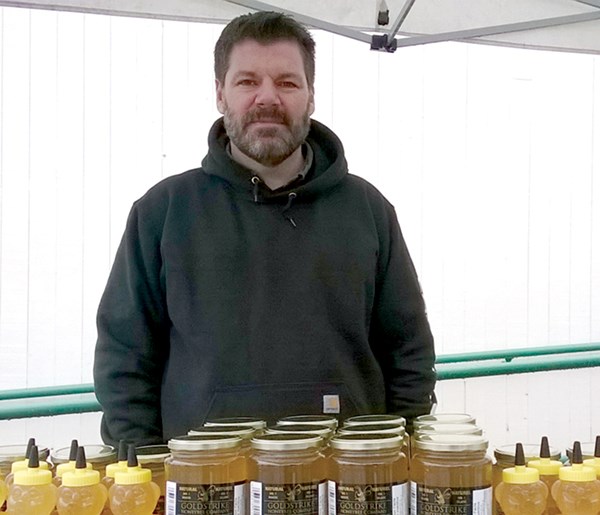“When I retire, they’ll probably just throw me in a bee box and send me off to sea,” laughs Steve Gourley, a self-taught beekeeper. “I just love it. It caught me the first day I did it.”
Gourley, owner of Goldstrike Honeybee Company at Squamish Farmers’ Market, started keeping bees eight years ago when his parents – who are third generation farmers in Delta – decided to grow cranberries, which are pollinated by bees. “There are so many cranberries grown in the valley though that it’s hard to find bees… so we decided to make our own.”
He went from 12 hives to 200 in four years; that’s approximately 8 million bees. Gourley runs the operation single-handedly. “You’re a jack-of-all-trades when you’re a beekeeper,” he says. “You’re a doctor, a nutritionist, a bookkeeper…”
It was his doctor/nutritionist side that first noticed something wasn’t right with his bees, prompting him to move his operation to Lillooet. “In Vancouver there were just so many chemicals used on the berry crops that it was rough on them. My bees were having trouble… so I decided to go after a cleaner crop,” he says.
After feeding on 100 per cent organic alfalfa blossom, his bees bounced back within the year.
That being said, this time of year causes Steve the greatest worry. “I don’t sleep that easy from now until March,” he says. “I’ve gotten them through winter… with 100 per cent success, but it’s this last month and a bit that’s the roughest on them.”
As daytime temperatures warm, the bees believe spring is here and start to reproduce, he explains. But plummeting nighttime temperatures place a big demand on food stores, and with a growing brood there’s a risk they’ll starve before winter is over.
To prevent this, Gourley drives from his home in Vancouver to Lillooet fortnightly to check his hives. “I make sure everybody’s fine and, if I have to, emergency-feed them with a little excess honey just to get them through. I don’t want to lose them now.”
Bears are another worry. “They’re enemy number one for a beekeeper,” he says, noting bears can destroy hives with ease. “I’d lose all of my production from those hives for the season. That’s a big hit. It takes me from making surplus honey to just making enough to survive.”
And then there are bee stings. “I get stung every day. It’s part of the job… but I’m totally immune now. I’ve been stung up to 50 times in one day and it doesn’t bother me.”
Despite sleepless nights, bear threats and multiple bee stings, Gourley wouldn’t do anything else.
Gourley sells Goldstrike Honey through Nesters, On the Farm Country Market and at Squamish Farmers’ Market, held every two weeks at Squamish Elementary School, 11 a.m. to 3 p.m. The next market will be held Feb. 7.



